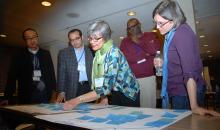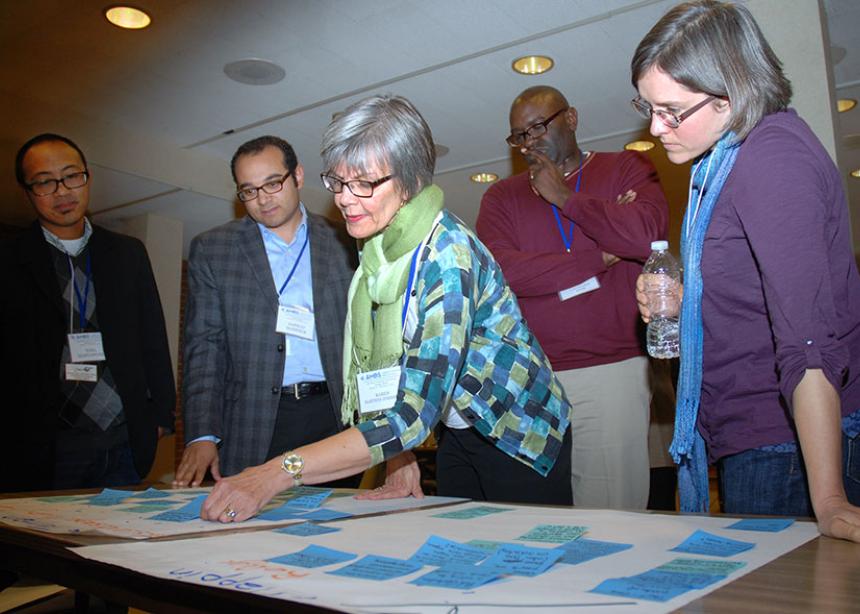Designs for equipping multi-vocational leaders with entrepreneurial skills and a view toward mission took shape as 23 business, mission, pastoral and educational representatives gathered for a three-day consultation in Chicago last fall at the invitation of Anabaptist Mennonite Biblical Seminary (AMBS, Mennonite Mission Network (MMN) and Mennonite Church Canada Witness.
In welcoming the participants, AMBS president Sara Wenger Shenk pointed to God’s Jubilee vision, expressed in Jesus’ proclamation, “The Spirit of the Lord is upon me to preach good news to the poor.” This, she said, was the inspiration for calling people from business, mission and education to imagine a program that would provide formation for ministry that is holistic, is grounded biblically and theologically, and also is accessible and affordable.
All of the pastors who participated combine congregational ministry with other occupations. For some, it is a necessity.
Yoel Masyawong, pastor of Grace Lao Mennonite Church, Kitchener, Ont., said that he works several other jobs so “I don’t need to burden the church.”
Others choose to combine ministry with another occupation.
“If I find myself in bi-vocational ministry, it’s because I can’t make up my mind,” Gerry Binnema said. He is pastor of United Mennonite Church, Black Creek, B.C., and is an airline safety consultant.
Leonard Dow was involved in banking when he began to feel a strong sense of call to ministry in his congregation, Oxford Center Mennonite Church in Philadelphia, Pa. “I didn’t walk into my call; the call jumped on me,” he said. Conversely, Jeremy Shue, a member of the pastoral team of Silverwood Mennonite Church, Goshen, Ind., said that when he studied at AMBS, “I knew I had a call to ministry and I knew that I had a call to business.”
While the stories from participants were interspersed through the weekend, an environmental scan provided context for the discussion from the beginning. AMBS staff reported from recent research on student educational debt, showing upward trends in the financial burden students carry into ministry. MMN and MC Canada Witness staff reviewed how educational debt has become a disincentive for people who feel called to serve in mission work.
In the opening session, SaeJin Lee, research assistant for AMBS, pointed to the Christ-given gifts for apostles, prophets, evangelists, shepherds (pastors), and teachers, highlighted in Ephesians 4:11-13. This text became a recurring theme in the following discussions, as participants emphasized the need today for the gifts of apostles, prophets and evangelists, describing them as generative, entrepreneurial gifts.
Participants learned that the websites of MC Canada and MC U.S.A. list more than 80 pastoral openings, with about half of those being half-time positions, while approximately half of the congregations in the North American Mennonite denomi-nations have fewer than 150 members, so they also may struggle to pay full-time salaries for their pastors.
Participants then moved to explore options for effective and sustainable models to prepare leaders for a changing church, considering four options: an intensive summer institute, congregational- or community-based learning centres, a certificate program, and a new concentration in an already existing master of divinity degree.
In a listening committee report, Karen Martens Zimmerly, MC Canada’s denominational minister, noted that the church needs the kinds of leaders represented by the apostles, prophets and evangelists in the Ephesians text. “We need to do our work to encourage those kinds of leaders and ministries to emerge,” she said. “The role of AMBS is to provide the deep theological, biblical reflection that continues to be important.”
Recommendations and counsel included an invitation to think in ways that redefine what is important for biblically grounded, entrepreneurial leaders. Another recommendation was to build partnerships with immigrant churches, reading the Bible with them and learning to be bilingual, intercultural, church-planting, social entrepreneurs. In addition, AMBS could make professors with apostolic-entrepreneurial gifts more available as resources to the church as well as in the classroom.
Speaking to the pastor-business participants at the conclusion of the sessions, Tim Froese, representing MC Canada Witness, said, “In so many of your stories there was a spark or two of God’s touch . . . . It didn’t start with the school or the business; it was that imperceptible touch. Where does that spark come from?”
—Posted Jan. 28, 2015

Consultation participants work in groups to review current realities for the church and the surrounding cultures. Working with factors related to congregations and religious groups are Yoel Masyawong, pastor in Kitchener, Ont., left; Safwat Marzouk, professor at AMBS; Karen Martens Zimmerly, MC Canada denominational minister; Leonard Dow, a pastor in Philadelphia, Pa.; and Anna Geyer, a farming entrepreneur in Oxford, Iowa.



Add new comment
Canadian Mennonite invites comments and encourages constructive discussion about our content. Actual full names (first and last) are required. Comments are moderated and may be edited. They will not appear online until approved and will be posted during business hours. Some comments may be reproduced in print.